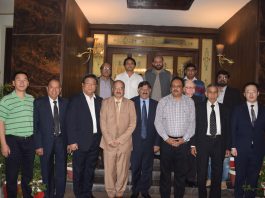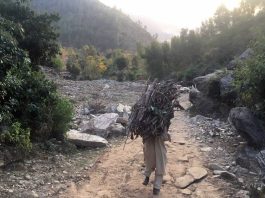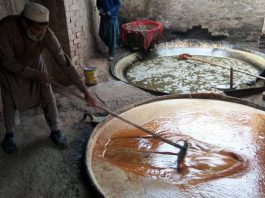Khyber Agency: Forget about the much-vaunted trade corridor between Pakistan and China. How about one that connects Pakistan to the Central Asian states? Not one but several. And through a region that needs it most – the economically-deprived tribal areas along the Pakistan-Afghanistan border.
Traders, businessmen and citizens from Pakistan and Afghanistan are pinning hopes for greater trade and cultural ties on a new customs and trade terminal built at the Torkhum border in the Khyber Agency, one of the seven tribal agencies bordering Afghanistan. The terminal built by the National Logistics Cell (NLC) – the logistics enterprise of Pakistan military – at the border crossing is run in cooperation with of civil government.
The border-crossing at Torkhum, a town in the Khyber Agency, is one of the three that connects Pakistan to Afghanistan. It connects Nangarhar province of Afghanistan with Pakistan’s Federally Administered Tribal Areas (FATA) and Khyber Pakhtunkhwa province. The other is in Balochistan, connecting the border town of Chaman to Kandahar. Yet another is the Wakhan corridor that connects Badakhshan in Afghanistan to Pakistan.
The Torkhum crossing is a busy port of entry between the two countries, serving as a major transporting, shipping, and receiving site. The mega terminal at the crossing, say traders and officials, would assist the burgeoning trade between the two countries and beyond.
“I believe not only handsome revenue would be generated from the terminal but it would facilitate passengers who travel across the border,” Naik Muammad, an administration official at Torkhum border, told News Lens Pakistan. He said a plan had been prepared for the Torkhum terminal where myriad facilitative services would be available to traders as one-window operation.
He said relevant offices of Federal Investigation Agency (FIA), National Database and Registration Authority (NADRA), Pakistan’s Customs and administration offices would work under one roof at the terminal, saving time and money for those seeking to do business or travel to Afghanistan.
Pakistan’s imports from Afghanistan amount to roughly USD 250 million. These include commodities such as dried and fresh fruit, carpets and herbal remedies. Pakistan also relies on Afghanistan as a trade conduit for its imports to Central Asian countries. There is a local saying in Afghanistan – “Everything we need comes from Pakistan, minus the air and water.”
According to the Afghanistan Chamber of Commerce and Industries, Afghanistan imports commodities worth USD 2.5 billion from Pakistan annually. These include food items, fabric, medication, plastic materials, electric tools and construction materials.
Pakistan’s impact on Afghan trade is huge, indicated by the fact that most transactions and financial deals are conducted in Pakistani rupees.
Journalist and businessman Ibrahim Shinwari told News Lens Pakistan that he was quite optimistic that the trade between the two countries would increase manifold if required facilities were provided to traders, reducing the bottlenecks caused by corruption, smuggling and insecurity.
According to the Afghanistantoday.org, a journalism portal that engages reporters from Pakistan and Afghanistan, the difficult road infrastructure and complications at the border also means that most Pakistani entrepreneurs prefer to do business through Afghan proxies even “when their presence is local economies is not just felt but shapes them too.”
“Construction of a state of the art terminal is good for traders and businessmen but the government should also relax taxes especially on traders belonging to the tribal areas,” said Ibrahim. “The government should also provide online banking facilities, restaurants and motels for traders and laborers. It should provide reliable internet communication to traders having offices at the Torkhum border.”
Naik Mohammad, the administration official at Torkhum said the traffic from and to Afghanistan was difficult to control dues to road conditions but allocating separate routes to vehicles and pedestrians had made a huge difference in organizing the traffic.
Mohammad said he personally knew several traders and businessmen who wanted to start business with Central Asian countries via Afghanistan. He said the Torkhum customs terminal was a big step towards realizing that objective.
Customs estimates put the average number of trade containers moving on Pakistani trucks from Pakistan to Afghanistan and back at 40,000-50,000. The fare of each truck from Karachi to Kandahar and Jalalabad ranges between Rs 250,000 to Rs 400,000 respectively, adding Rs 13bn to the national economy annually.
Traders like Shinwari are of the view that if the government of Pakistan seriously pursued trade with Afghanistan, it would also help boost trade relations with central Asia and gulf countries.
“Rupees 30 million (USD 3 million) can be generated as export and import revenue through the Torkhum border terminal if the project is successfully completed on time,” said Shinwari. He said smuggling taking place through the Torkhum border could be controlled through a well-equipped terminal.
Shinwari believes that the Torkhum terminal would bring economic prosperity to the country saving thousands of educated but unemployed youth in Khyber Agency from falling prey to militancy and militants. He suggested if a picnic spot and restaurant were added to the project, it would attract national and international tourists to visit the historical Khyber Pass and Torkham border with Afghanistan.
Zamin Shah Afridi, a former customs official who has worked at Torkhum for 17 years, told News Lens Pakistan that the project would not make a huge difference in terms of development and opportunity for locals but would help change a black economy into white.
“The Torkham border could be used as corridor with the GCC and central Asian countries if a joint venture is launched with Afghanistan to extend trade and commerce to other countries,” said Afridi. He said that a same volume of export and export took place back when he was posted at the Torkhum border but the money went to a few officials rather than the government’s bank account.
Yasin Omer, an Afghan businessman, who runs an import and export business between Pakistan and Afghanistan, said non-availability of a bank at the Torkhum border forced traders to bring money in pockets. He said traders transferred money from Afghanistan and Pakistan via hundi – an informal, undocumented money transfer mechanism.
However, Omer said they were told that it would be among the biggest customs and trade terminals in the world where all facilities would be available under one roof for traders and passengers coming in from across the border.
He said such projects would not only generate business opportunities in the region but also encourage cultural exchange between the neighboring states.
“As peace is gradually restored in Pakistan and Afghanistan, such facilitative projects would lead to trade and cultural exchanges strengthening ties between the citizens of the two countries,” said Omer.



